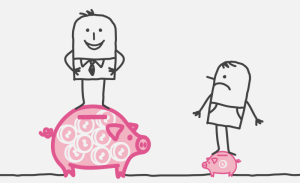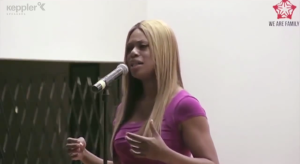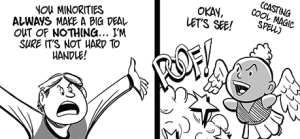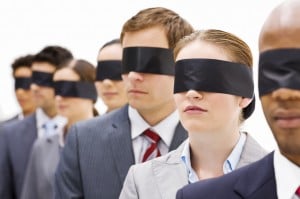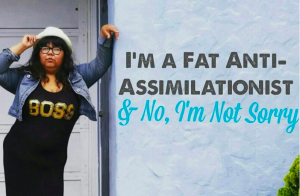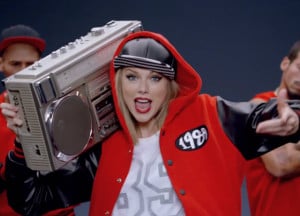
Source: De Rose International
There are a lot of really wonderful, well-intentioned men who have a difficult time understanding the difference between being nice to women and being an ally to women and women’s causes.
Then there are other men who pretend to be nice in order to validate their manipulation of women for sex and romance. These are the people who I like to refer to as Nice Guys™.
While this article is dedicated to helping nice men become better feminist allies, I want to take a second to clarify the difference between an authentically nice guy and a Nice Guy™.
Nice Guys™, as many of you know, have become the object of much loathing in feminist circles and among women and girls in general.
Online, this is the guy who posts hashtags like #NotAllMen and #ReverseSexism, whenever we publish articles about street harassment, rape culture, and male privilege.
He is the exaggeratedly faux timid (read: passive aggressive) dude who still complains about the girls that didn’t date him in high school on message boards and in every other status update.
Though the most stereotypical incarnation of the Nice Guy™ is a fedora-clad dudebro who spends too much time on Reddit and would probably push a six-year-old girl out of the way to get his hands on My Little Pony merchandise, the more garden-variety Nice Guy™ can be more difficult to spot.
Basically, he’s anyone who regards sex as the ultimate goal of interacting with women, and in turn views the idea of a nonsexual friendship with a woman as an abysmal failure.
Trademarks of a Nice Guy™ include trying to guilt trip women into having sex, claiming that sex should be the inevitable reward for basic acts of friendship, and only being interested in building a friendship until the woman in question rejects them romantically.
When he gets rejected, he cites every single time they did something nice for her, repeatedly asks her out (as in stalks her), and calls her a coldhearted bitch if she refuses to magically reciprocate his feelings within an almost instantaneous period of time.
A Nice Guy™ truly cements his status as soon as he begins to complain that “women only date assholes.”
These men all seem to share the core belief that the women they are interested in owe them sex or romance to compensate for “investing” their time and energy into making them actually believe that they were decent human beings – even if only for a brief period of time.
Needless to say, women don’t take kindly to this sort of logic.
As such, the figure of the Nice Guy™ easily becomes synonymous with misogyny and a lack of compassion for women’s issues.
But what if you’re not a Nice Guy™? What if you’re just a really nice guy?
You may well be genuine and 100% sincere, but the way men are socialized around gender means that even the most goodhearted guys are susceptible to sexist slip-ups (and might accidentally, unintentionally participate in some Nice Guy™ tomfoolery).
If you grow up being taught that you aren’t allowed to express emotion or cry, that the only way to be masculine is to be macho or aggressive, and that the only way to bond with other men is through shared objectification of women, it can be extraordinarily difficult to recognize when you’re being sexist – especially if you’re well-intentioned.
Besides, it’s true: Paying for lunch for your female friend is a far cry from cracking kitchen jokes.
However, we need and expect more than that from the men in our lives.
We can all work together to liberate ourselves from such toxic norms, but it’s time for you to use your position of male privilege to help create a platform for women as well.
Men should feel a responsibility to defend and advocate for women in ways encompassing more than chivalry. Just because you’re not involved in tearing us down doesn’t mean you’re off the hook for helping build us up.
Let’s discuss the driving social forces behind accidental or “benign” sexism and talk about how you can use self introspection to check your privilege and become a better male feminist ally.
Gender and Culture Often Influences Unintentional Sexism
Think about how male/female interaction and male/female friendship is portrayed in the media: Romantic implications almost immediately overshadow every dynamic. We’re not taught to envision relationships that don’t have a sexualized end goal.
But even if your relationship is not romantic or even inclined towards that possibility, it’s still probably impacted by gender and gender roles.
Because men are positioned as protective authority figures and women are allegedly fragile or in need of that guidance or protection, men are expected to play the dominant role in relationships with women.
Given that dominance can be associated with aggression, nice guys are taught to be chivalrous towards women to prove that they’re gentlemen. You’re supposed to hold open doors, pull out chairs, and so on.
Though there are many problems with this dynamic, the primary concern is that Nice Guys™ expect this behavior to be immediately rewarded. That’s male entitlement.
Nice guys, however, operate more under the assumption that they should be chivalrous towards all women because that’s just how you’re supposed to act.
That’s less male entitlement and more male obligation.
Ultimately, you are still treating women differently specifically because they’re women. What you see as a sign of respect or kindness, she might see as a sign that you perceive her to be inferior or incapable of taking care of herself.
Unintentional sexism is still sexism.
Don’t treat your friend well because she’s a woman, treat her well because you like her as a person.
You know how men are always told to respect a woman because she’s someone’s wife/mother/sister? That tagline pretty much encapsulates everything that’s wrong with gender relations in our culture.
You should respect all women because they’re human beings first and foremost. A woman’s humanity and individuality always supersedes her gender. Let her tell you how she wants to be treated. If you’re unclear, ask questions rather than make generalized assumptions.
Make it clear that you support the women in your life as peers and equals.
It’s True That Nice Guys Only Get So Far – If Your Sole Goal For Interacting with Women Is Sex or Romance
I know, I made a pun on the whole “nice guys finish last” mantra. Forgive me.
I want to remind you that I’m not out to accuse you of purposefully feeding into patriarchy every time you open a car door for a girl. I don’t think you conduct your relationships with malice intent.
I just want you to understand the wider, potentially corrosive social implications of such interaction.
However, it’s important to note that men are very quick to absolve themselves of responsibility for sexism. As soon as they’ve successfully proven they’re not part of the problem, the problem isn’t a problem anymore.
It is not just a male phenomenon. I think we all do it from time to time. Someone presents us with an issue and we feel uncomfortable so we pay attention long enough to reassure ourselves that we’re not directly responsible for it. Once we reach that point, we breathe a sigh of relief and go back to pretending the issue doesn’t exist.
Or at least we’re much less inclined to take the issue as seriously.
Admit it – at the beginning of this article, you were probably patting yourself on the back because you’re not a Nice Guy™. But, you have to agree that simply not being a gross dudebro is a pretty low bar in terms of battling sexism. It is, however, a good entry point.
We all have a tendency to self congratulate for baby steps and then wash our hands of the bigger picture. The same applies to sexism.
Passivity is still complicity.
Just because you’re not actively or intentionally sexist or misogynistic doesn’t mean that you aren’t involved in creating an environment that perpetuates those forces.
I want you to turn off the impulse that tells you to tune out. Your friends need your support for women’s issues much more than they need you to buy them a coffee.
In the long run, a higher degree of social literacy and awareness of feminist issues will reflect much more highly on your character than any amount of chivalry ever could.
You need to go beyond being a nice guy.
It’s Possible to Become a Better Male Ally – And This Is How to Do It!
Now it’s time to talk about what it means to be a – gasp – male feminist.
Men and women alike are taught that even uttering the word feminist should be avoided like the plague. And while they usually react to feminism the way vampires react to garlic, some Nice Guys™ claim to be feminists in hopes of getting into a girl’s pants.
I’m assuming you already know that feminism is neither kryptonite for your sex life, nor should it be used as a tool to get brownie points with women. The connotations of the word have been blown way out of proportion.
When everything boils down, the benefits of feminism are easy to grasp. Everyone should be equal! Nice Guys™ hurt everyone! Gender roles hurt everyone! Patriarchy oppresses women, but it also hurts men in the process by stunting their emotions and limiting their self-expression!
You might still be a little wary, and that’s understandable. Feminism can be difficult for even the most well-intentioned of men to navigate.
Whenever you have someone from the privileged majority attempting to ally themselves with a marginalized group, toes can be stepped on, however unintentionally. Occasionally allies will monopolize the conversation.
Trying to integrate men into the feminist movement can be challenging. It’s important to remember that as a man, you’re accustomed to always having your opinions validated. As an ally, you have a duty to not only listen, but to support and respect women’s experiences.
You’re going to enter feminist discussions with the knowledge that you’re not going to be the most well-informed person at the table. Approach the exploration of your privilege as a learning opportunity.
Another crucial thing to keep in mind is that you’re an ally for women, not their spokesperson.
If you start speaking for women instead of on their behalf, feminist dialogues become men telling other men how to treat women, which—well—feels a lot like patriarchy.
For example, men can and should tell other men not to rape women.
That’s an important message, but if you speak over women who are advocating for themselves in the process, it continues to reinforce the idea that men have to speak on women’s issues to make them relevant and legitimate, which completely undermines the point of feminism.
To avoid this, be aware of your responsibilities and limitations as a male ally. Teach other men about feminism. Know when to sit back and be quiet. Never go seeking out brownie points.
Remember that it’s not your decision to determine whether or not you’re an ally. That’s up to women!
A Critical Part of Being an Ally Is Talking to Your Female Friends About How You Treat Them
Absorbing all of this information at once may be overwhelming, so start out by implementing it on an every day level.
Open up a dialogue with the women in your life. Talk to them about their experiences and think about ways that you can support them. If you have been treating them differently because of their gender, be open about it and ask how it impacts them.
Nice guys are important because they have the potential to be excellent male allies. You care about women and even though you may have stumbled with unintentional sexism, that’s also a great jumping off point for unpacking the intricacies of how gender impacts your relationships.
You need to be more than nice guys, but that doesn’t make you inadequate. Inexperience with social issues is not the same as willful ignorance.
You have great potential. Working together, we can accomplish a lot.
Today’s nice guys can be tomorrow’s feminists.
[do_widget id=”text-101″]
Erin Tatum is a Contributing Writer at Everyday Feminism. She’s a feminist, queer theory lover, and television enthusiast living in Pennsylvania. She is particularly interested in examining the representation of marginalized identities in media. In addition to Everyday Feminism, she’s also a weekly contributor to B*tch Flicks. Follow her on Twitter @ErinTatum91.
Search our 3000+ articles!
Read our articles about:
Our online racial justice training
Used by hundreds of universities, non-profits, and businesses.
Click to learn more





